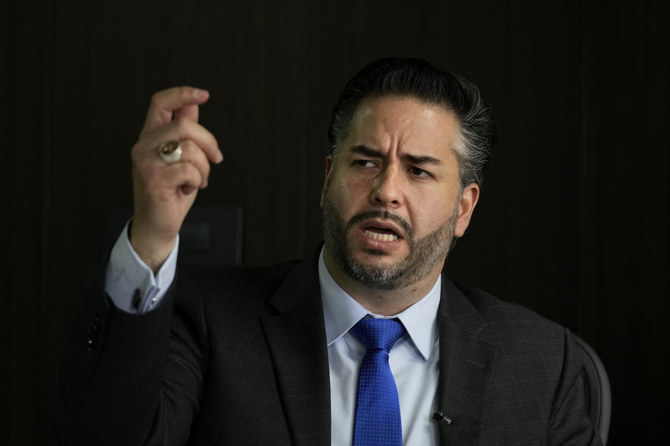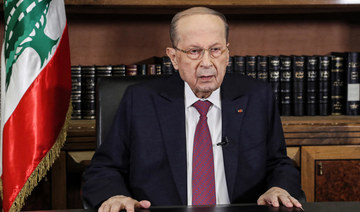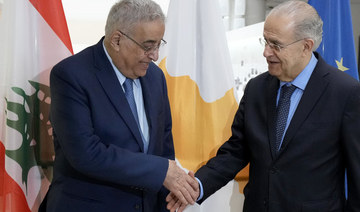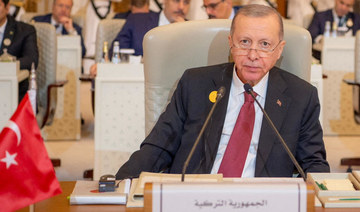BEIRUT: Lebanon is close to reaching an agreement with the World Bank in which the international agency would give the crisis-hit country a $150 million loan for food security and to stabilize bread prices for the next six months, the economy minister said Tuesday.
Amin Salam said talks with the International Monetary Fund were progressing in a positive way.
“Work is ongoing and the train is moving. I am optimistic,” Salam said in an interview with The Associated Press. He said the IMF is focusing on three sectors that are improving — electricity, transportation and high-speed Internet — because they can help reactivate the whole economy.
Salam said the government does not have immediate plans to lift bread subsidies, especially for flour used in making flat Arabic bread, the main staple in Lebanon.
Lebanon is in the grip of a devastating economic crisis that has been described as one of the worst in modern history. It imports most of its wheat and has faced shortages over the past weeks as the war in Ukraine leads to increases in prices of oil and food products around the world.
There have also been concerns that the government might lift wheat subsidies as foreign currency reserves drop to critical levels at the central bank. Any lifting of subsidies would sharply increase the price of bread affecting the poor in the Mediterranean nation where more than three quarters of its 6 million people, including 1 million Syrian refugees, now live in poverty.
“We are working with the World Bank to keep market stability for the next six months by getting $150 million,” Salam said. He added that the deal with the World Bank will stabilize the price of bread and wheat until a ration card policy is in force so that people in need can benefit.
Salam added that subsidies cannot continue forever, especially for flour that is used for making pastries and sweets. He said that such policies were implemented in Egypt and other countries where subsidies were lifted for wheat used in some products and left for the bread.
Salam said meetings were scheduled with officials from the World Bank on Wednesday, after which Lebanon will propose final recommendations to the bank’s board. Salam said there is tentative approval from the Lebanese state and the World Bank, adding that it could be effective in three weeks to a month.
He said that the war in Ukraine is forcing Lebanon to find new sources of wheat that are far away and more expensive.
Earlier this month, Lebanon and the IMF reached a tentative agreement for comprehensive economic policies that could eventually pave the way for some relief for the country after Beirut implements wide-ranging reforms.
Salam, who is part of the Lebanese negotiating team with the IMF, said the government, parliament and all Lebanese officials are fully aware that if Lebanon does not fully abide by the IMF program, conditions ″will become very difficult because there is no alternative plan.″
He said the banking sector has to be restructured because without a banking sector it is impossible to move forward with economic growth. Salam added that during the talks with the IMF the Lebanese side worked to make “the banking sector carry some of the losses without destroying the banking sector.”
He said whenever a final deal with the IMF is reached and there is political intention for success by authorities, Lebanon can start achieving tangible results in the next two to three years. And in five years “Lebanon can be in a very good place.”
The Lebanese pound, which has lost more than 90 percent of its value since the economic meltdown began in October 2019, can become more stable, he said.
The staff level agreement that Lebanon reached with the IMF on April 7 lists five “key pillars” that should be implemented, including restructuring the financial sector, implementing fiscal reforms, and the proposed restructuring of external public debt, anti-corruption and anti-money laundering efforts.
Salam said the country’s 14 largest banks will be held up as a standard to work on restructuring the sector since they control about 80 percent of the market. The smaller banks that have problems should be taken over by bigger lenders. He said most likely people with deposits of up to $100,000 will eventually get their money back while those with much bigger balances will end up either getting treasury bills or become shareholders in banks or state institutions.
“The 100,000 figure will be a number that will be protected for everyone,” he said.
Breaking with the position of the prime minister, he suggested that central bank Gov. Riad Salameh should go.
″His situation has become tenuous,″ Salam said, saying it will be difficult for future governments in Lebanon to work with him.
Salameh, who has been in the job since 1993, is facing investigations in Lebanon and several European countries into possible cases of money laundering and embezzlement. The governor is protected by several top officials, including the prime minister and parliament speaker.
“I’m all for change,” Salam said. “No one is irreplaceable.”
Lebanon expects deal with World Bank on food security
https://arab.news/27zfu
Lebanon expects deal with World Bank on food security

- Amin Salam said talks with the International Monetary Fund were progressing in a positive way
- He said the IMF is focusing on three sectors that are improving — electricity, transportation and high-speed internet
No indication from Israel that Rafah crossing could open soon, Palestinian minister says

- Rafah was a major entry point for humanitarian relief before Israel stepped up its military offensive on the Gaza side of the border
“Since it was closed, we have no indication that the Israelis would like it to be opened any time soon,” the minister, Majed Abu Ramadan, told reporters on the sidelines of the World Health Assembly in Geneva.
Rafah was a major entry point for humanitarian relief before Israel stepped up its military offensive on the Gaza side of the border earlier this month and seized control of the crossing from the Palestinian side.
Iran’s Tasnim news agency: Iran made sea-launched ballistic missile available to Houthis

- Iran’s foreign ministry did not immediately respond to a request for comment
- Iran is armed with the largest number of ballistic missiles in the region
DUBAI: Iran’s semi-official Tasnim news agency reported on Wednesday that Tehran’s sea-launched ballistic missile Ghadr has been made available to Yemen’s Houthis.
“Iran’s sea-launched ballistic missile, named Ghadr, now has been made available to Yemen’s (Houthi) fighters,” — reported Tasnim, which is believed to be affiliated to Iran’s elite Revolutionary Guards.
“Now, the missile … has become a weapon capable of presenting serious challenges to the interests of the United States and its main ally in the region, the Zionist regime,” Tasnim said.
Iran’s foreign ministry did not immediately respond to a request for comment.
Iran supports the Houthis but has repeatedly denied arming the group.
The Houthis have been attacking shipping lanes in and around the Red Sea to show support for Palestinians in the Gaza war impacting a shipping route vital to trade.
According to the US Office of the Director of National Intelligence, Iran is armed with the largest number of ballistic missiles in the region. It is also a major producer of drones.
Turkiye’s Erdogan says ‘spirit of United Nations dead in Gaza’

- Calls on the ‘Islamic world’ to react after the latest deadly Israeli strikes in Gaza
- Turkish premier hits out at fellow Muslim-majority countries for failing to take common action over the Israeli strike
ANKARA: Turkish President Recep Tayyip Erdogan on Wednesday hit out at the United Nations and called on the “Islamic world” to react after the latest deadly Israeli strikes in Gaza.
“The UN cannot even protect its own staff. What are you waiting for to act? The spirit of the United Nations is dead in Gaza,” Erdogan told lawmakers from his AKP party.
Erdogan’s comments came as the UN Security Council met to discuss a deadly Israeli attack on a displacement camp west of Rafah on Tuesday that killed 21 people, according to a civil defense official in Hamas-run Gaza.
The Turkish premier also hit out at fellow Muslim-majority countries for failing to take common action over the Israeli strike.
“I have some words to say to the Islamic world: what are you waiting for to take a common decision?” Erdogan, who leads a Muslim-majority country of 85 million people, told lawmakers from his AKP party.
“Israel is not just a threat to Gaza but to all of humanity,” he said.
“No state is safe as long as Israel does not follow international law and does not feel bound by international law,” Erdogan added, repeating an accusation that Israel is committing “genocide” in Gaza.
Three Israeli soldiers killed in combat in southern Gaza, military says

- Israeli forces have kept up their offensive in Rafah, defying an order from the International Court of Justice
JERUSALEM: The Israeli military said three soldiers had been killed in combat in southern Gaza on Wednesday, as it pressed ahead with its offensive in Rafah.
Three more soldiers were badly wounded in the same incident, the military said, though it provided no further details. Israel’s public broadcaster Kan radio said they were injured by an explosive device set off in a building in Rafah.
Defying an order from the International Court of Justice, Israeli forces have kept up their offensive in Rafah, where they aim to root out the last major intact formations of Hamas fighters and rescue hostages.
International unease over Israel’s three-week-old Rafah offensive has turned to outrage since an airstrike on Sunday set off a blaze in a tent camp in a western district of the city, killing at least 45 people.
Israel said it had been targeting two senior Hamas operatives and had not intended to cause civilian casualties. Prime Minister Benjamin Netanyahu said that “something unfortunately went tragically wrong.”
The Israeli military said it was investigating the possibility that munitions stored near a compound targeted by Sunday’s airstrike may have ignited.
Israel told around one million Palestinian civilians displaced by the almost eight-month-old war to evacuate from Rafah before launching its incursion in early May. Around that many have fled the city since then, according to the UN agency for Palestinian refugees, UNRWA.
On Tuesday, the United States, Israel’s closest ally, reiterated its opposition to a major Israeli ground offensive in Rafah but said it did not believe such an operation was under way.
Syrians in Lebanon fear unprecedented restrictions, deportations

- Lebanon remains home to the largest refugee population per capita in the world: roughly 1.5 million Syrians
- Five million Syrian refugees who spilled out of Syria into neighboring countries, while millions more are displaced within Syria
BEKAA VALLEY: The soldiers came before daybreak, singling out the Syrian men without residence permits from the tattered camp in Lebanon’s Bekaa Valley. As toddlers wailed around them, Mona, a Syrian refugee in Lebanon for a decade, watched Lebanese troops shuffle her brother onto a truck headed for the Syrian border.
Thirteen years since Syria’s conflict broke out, Lebanon remains home to the largest refugee population per capita in the world: roughly 1.5 million Syrians — half of whom are refugees formally registered with the United Nations refugee agency UNHCR — in a country of approximately 4 million Lebanese.
They are among some five million Syrian refugees who spilled out of Syria into neighboring countries, while millions more are displaced within Syria. Donor countries in Brussels this week pledged fewer funds in Syria aid than last year.
With Lebanon struggling to cope with an economic meltdown that has crushed livelihoods and most public services, its chronically underfunded security forces and typically divided politicians now agree on one thing: Syrians must be sent home.
Employers have been urged to stop hiring Syrians for menial jobs. Municipalities have issued new curfews and have even evicted Syrian tenants, two humanitarian sources told Reuters. At least one township in northern Lebanon has shuttered an informal camp, sending Syrians scattering, the sources said.
Lebanese security forces issued a new directive this month shrinking the number of categories through which Syrians can apply for residency — frightening many who would no longer qualify for legal status and now face possible deportation.
Lebanon has organized voluntary returns for Syrians, through which 300 traveled home in May. But more than 400 have also been summarily deported by the Lebanese army, two humanitarian sources told Reuters, caught in camp raids or at checkpoints set up to identify Syrians without legal residency.
They are automatically driven across the border, refugees and humanitarian workers say, fueling concerns about rights violations, forced military conscription or arbitrary detention.
Mona, who asked to change her name in fear of Lebanese authorities, said her brother was told to register with Syria’s army reserves upon his entry. Fearing a similar fate, the rest of the camp’s men no longer venture out.
“None of the men can pick up their kids from school, or go to the market to get things for the house. They can’t go to any government institutions, or hospital, or court,” Mona said.
She must now care for her brother’s children, who were not deported, through an informal job she has at a nearby factory. She works at night to evade checkpoints along her commute.
’Wrong $ not sustainable’
Lebanon has deported refugees in the past, and political parties have long insisted parts of Syria are safe enough for large-scale refugee returns.
But in April, the killing of a local Lebanese party official blamed on Syrians touched off a concentrated campaign of anti-refugee sentiment.
Hate speech flourished online, with more than 50 percent of the online conversation about refugees in Lebanon focused on deporting them and another 20 percent referring to Syrians as an “existential threat,” said Lebanese research firm InflueAnswers.
The tensions have extended to international institutions. Lebanon’s foreign minister has pressured UNHCR’s representative to rescind a request to halt the new restrictions and lawmakers slammed a one billion euro aid package from the European Union as a “bribe” to keep hosting refugees.
“This money that the EU is sending to the Syrians, let them send it to Syria,” said Roy Hadchiti, a media representative for the Free Patriotic Movement, speaking at an anti-refugee rally organized by the conservative Christian party.
He, like a growing number of Lebanese, complained that Syrian refugees received more aid than desperate Lebanese. “Go see them in the camps — they have solar panels, while Lebanese can’t even afford a private generator subscription,” he said.
The UN still considers Syria unsafe for large-scale returns and said rising anti-refugee rhetoric is alarming.
“I am very concerned because it can result in... forced returns, which are both wrong and not sustainable,” UNHCR head Filippo Grandi told Reuters.
“I understand the frustrations in host countries — but please don’t fuel it further.”
Zeina, a Syrian refugee who also asked her name be changed, said her husband’s deportation last month left her with no work or legal status in an increasingly hostile Lebanese town.
Returning has its own dangers: her children were born in Lebanon and do not have Syrian ID cards, and her home in Homs province remains in ruins since a 2012 government strike that forced her to flee.
“Even now, when I think of those days, and I think of my parents or anyone else going back, they can’t. The house is flattened. What kind of return is that?” she said.




















